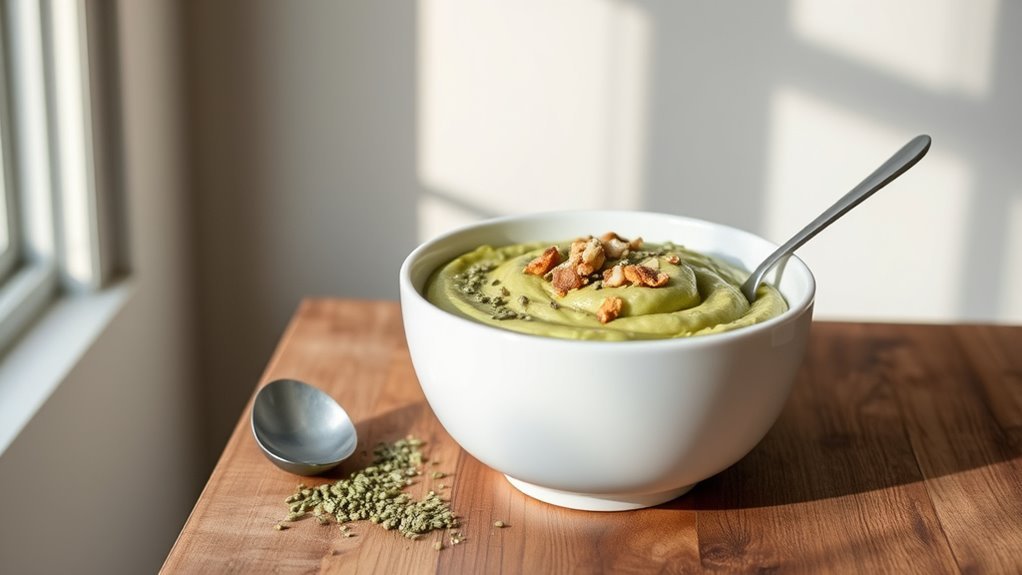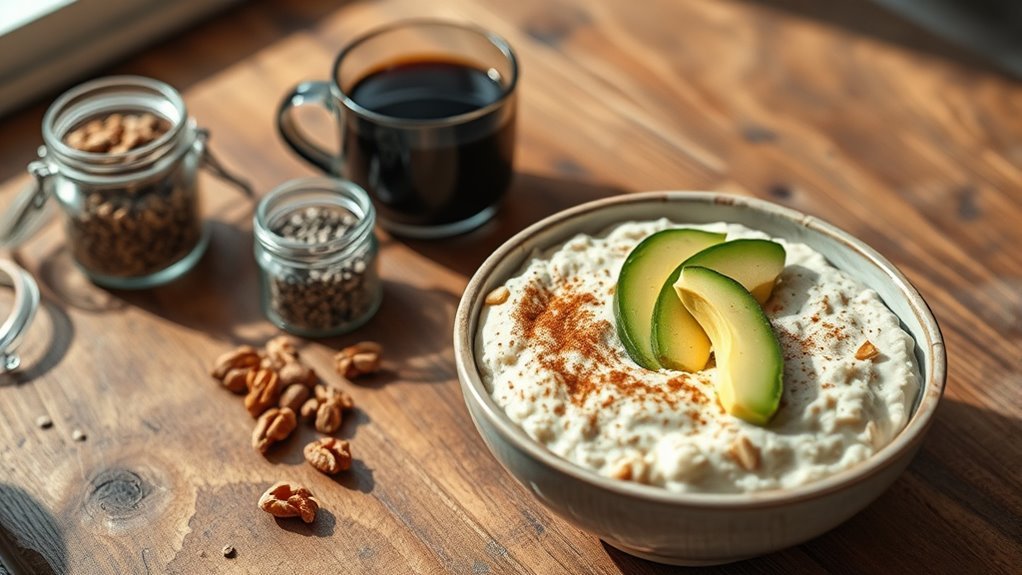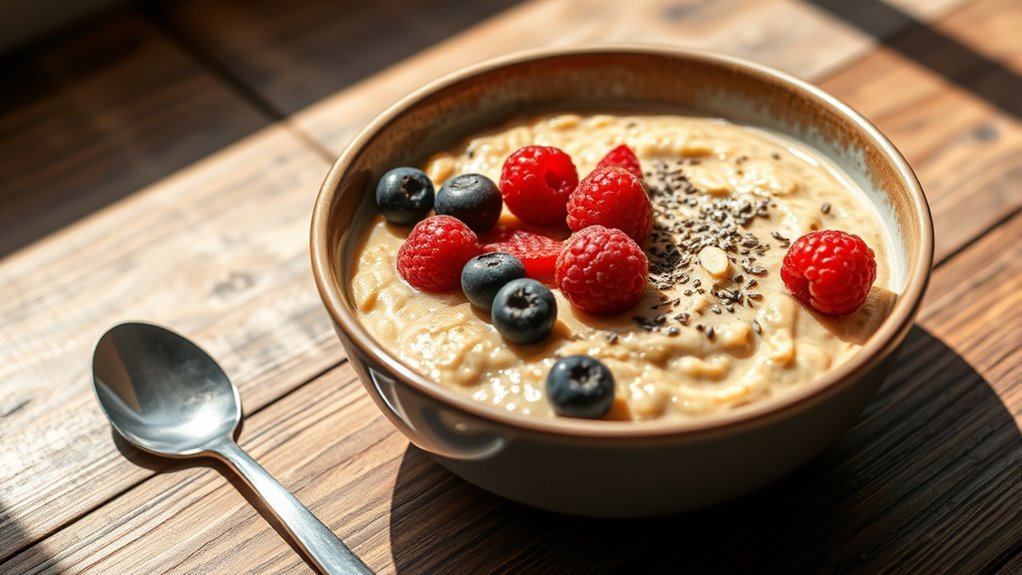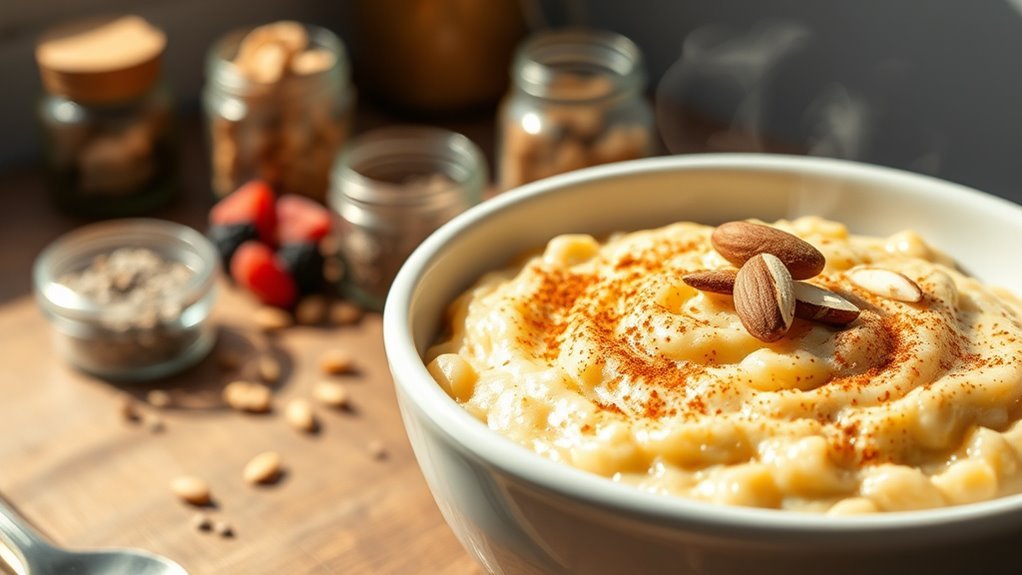Oatmeal typically isn’t keto-friendly due to its high carbohydrate content, which can exceed your daily limit for maintaining ketosis. A single serving contains around 27 grams of carbs, making it tricky to fit into a low-carb diet. However, considering low-carb alternatives like chia seed pudding or flaxseed meal can be beneficial. Using these alternatives allows you to enjoy a similar texture while staying within your carb limits. Discover more options and tips for a successful keto plan ahead.
Understanding the Ketogenic Diet

While many diets come and go, the ketogenic diet has gained significant attention for its unique approach to weight loss and overall health. At its core, the ketogenic principles emphasize a high-fat, low-carbohydrate intake that shifts your body into a state of fat adaptation. This metabolic state allows your body to burn fat for energy instead of carbohydrates, leading to improved fat oxidation and potentially enhanced mental clarity. By reducing carbohydrate intake, you minimize insulin spikes, which can promote fat storage. Embracing a ketogenic lifestyle may provide you with the freedom to enjoy satisfying meals while achieving your weight loss goals. Understanding these principles is essential as you navigate this dietary shift and its potential benefits for your long-term health.
Nutritional Profile of Oatmeal

When considering oatmeal’s nutritional profile, it’s essential to analyze its carbohydrate content, especially in the context of a ketogenic diet. Oatmeal is known for its high fiber content, which offers various health benefits, but it also contains significant carbohydrates that can impact ketosis. Understanding these factors will help you make informed choices about incorporating oatmeal into your meal plan.
Carbohydrate Content Analysis
Although oatmeal is often touted for its health benefits, its carbohydrate content can pose challenges for those following a ketogenic diet. A typical serving of cooked oatmeal contains around 27 grams of carbohydrates, which can quickly exceed your daily limit on keto. Here’s a simple comparison of oatmeal and some keto-friendly alternatives:
| Food Item | Carbohydrates (g) | Keto Friendly? |
|---|---|---|
| Oatmeal (1 cup) | 27 | No |
| Chia Seeds (2 tbsp) | 12 | Yes |
| Flaxseed Meal (2 tbsp) | 4 | Yes |
While oatmeal may be nutritious, it’s essential to take into account these carbohydrate counts when exploring oatmeal alternatives. Opting for keto-friendly grains can help you stay on track with your dietary goals.
Fiber and Nutrients Overview
Oatmeal is often praised for its impressive fiber content and various nutrients, making it a staple in many healthy diets. It’s an excellent source of soluble fiber, which can enhance nutrient absorption and promote gut health. When you consume oatmeal, the beta-glucans within it can help regulate cholesterol levels while providing a slow release of energy, keeping you satisfied longer. Additionally, oatmeal contains essential vitamins and minerals like magnesium, phosphorus, and B vitamins, which support overall health. However, if you’re considering a keto lifestyle, you’ll want to be mindful of the carbohydrate content. While oatmeal is a great fiber source, it may not align with strict keto guidelines due to its higher carb count. Balancing your choices is key.
The Carb Conundrum: Is Oatmeal Keto-Friendly?

How does oatmeal stack up against the strict carb limits of a ketogenic diet? Unfortunately, traditional oatmeal is high in carbohydrates, making it a challenge for keto enthusiasts. A typical serving can exceed your daily carb allowance, which is usually around 20-50 grams.
Here’s a comparison of oatmeal and potential substitutes:
| Food Item | Net Carbs (per serving) |
|---|---|
| Traditional Oatmeal | 27g |
| Chia Seeds | 2g |
| Flaxseed Meal | 0g |
| Almond Flour | 2g |
| Coconut Flour | 6g |
If you’re aiming for a keto breakfast, consider these oatmeal substitutes. They can help you enjoy a satisfying meal without compromising your carb limits.
Alternatives to Traditional Oatmeal
If you’re looking to maintain a ketogenic lifestyle while still enjoying a warm breakfast, there are several alternatives to traditional oatmeal that can satisfy your cravings without derailing your carb goals. Consider these oatmeal substitutes made from keto grains:
- Chia Seed Pudding: Packed with fiber and healthy fats, chia seeds can create a creamy, satisfying base.
- Flaxseed Meal: Rich in omega-3s, flaxseed meal can be mixed with water to form a porridge-like consistency.
- Coconut Flour: This low-carb flour can be combined with water and spices to mimic the texture of oatmeal.
- Almond Meal: A great source of protein and healthy fats, almond meal can be cooked with unsweetened almond milk for a delicious alternative.
These options let you enjoy breakfast freedom while staying keto-compliant!
Low-Carb Oatmeal Recipes
While sticking to a ketogenic diet can make traditional breakfast options challenging, there are several low-carb oatmeal recipes that can fulfill your morning cravings without exceeding your carb limits. One popular low-carb alternative is chia seed pudding; just mix chia seeds with unsweetened almond milk for a creamy texture. You can also try flaxseed meal oatmeal, combining it with water and spices like cinnamon for flavor. Topping these options with keto toppings, such as nuts, berries, or a dollop of almond butter, enhances taste and nutritional value. These alternatives not only satisfy your oatmeal cravings but also align well with the principles of a ketogenic lifestyle, keeping your carb intake in check while allowing for creativity in your breakfast choices.
Tips for Enjoying Oatmeal on Keto
When you’re steering through a ketogenic diet, enjoying oatmeal requires some strategic adjustments to align with your low-carb goals. Instead of traditional oats, consider these oatmeal substitutes that are lower in carbs but still satisfying:
- Chia seeds: High in fiber and omega-3s, they create a pudding-like texture.
- Flaxseed meal: Packed with nutrients, it adds a nutty flavor while thickening your dish.
- Shredded coconut: Provides healthy fats and a tropical twist.
- Almond flour: A versatile option that can mimic the texture of oats.
To enhance your creation, explore various keto toppings like unsweetened almond milk, berries, or nuts. These choices not only keep your carb count low but also allow for a delicious, fulfilling breakfast experience without straying from your keto lifestyle.
Common Mistakes to Avoid
Enjoying oatmeal substitutes on a keto diet can be a delightful experience, but it’s easy to make missteps that can derail your progress. Common pitfalls include choosing the wrong oatmeal variations or falling for keto misconceptions. For instance, not checking carb counts can lead to unwanted spikes in your daily intake.
| Mistake | Description | Solution |
|---|---|---|
| Ignoring Portion Sizes | Overeating low-carb options can add up. | Measure servings carefully. |
| Relying on Processed Foods | Many “keto-friendly” products are misleading. | Opt for whole foods. |
| Neglecting Nutritional Balance | Focusing solely on fats can harm health. | Include veggies and proteins. |
| Skipping Meal Planning | Lack of preparation can lead to poor choices. | Plan meals in advance. |
Stay informed and make deliberate choices for success!
The Role of Fiber in Keto
Fiber plays an essential role in the ketogenic diet, as it not only aids digestion but also helps maintain stable blood sugar levels. Incorporating adequate fiber sources into your meals can enhance your overall digestive health while keeping you feeling full longer.
Here are some key benefits of fiber on keto:
- Promotes regular bowel movements: Helps prevent constipation, a common concern on low-carb diets.
- Supports gut bacteria: Aids in maintaining a healthy microbiome.
- Reduces hunger: Keeps you satisfied, making it easier to stick to your eating plan.
- Stabilizes blood sugar: Helps mitigate spikes and crashes in glucose levels.
Finding Balance: Moderation and Portion Control
When it comes to enjoying oatmeal on a keto diet, portion size plays a critical role in maintaining your carbohydrate limits. It’s crucial to take into account nutrient density, ensuring that what you eat not only fits your macros but also provides valuable vitamins and minerals. Plus, mastering carb counting can help you strike the right balance between satisfaction and staying within your dietary goals.
Portion Size Matters
While it may seem counterintuitive, portion size plays an essential role in maintaining a ketogenic diet, especially when incorporating foods like oatmeal. To enjoy oatmeal while adhering to keto principles, you’ll need to practice effective portion control and be mindful of serving sizes.
Consider these guidelines to find the right balance:
- Limit your serving to about 1/4 cup of dry oatmeal.
- Pair it with high-fat ingredients like butter or cream.
- Monitor your total daily carb intake to stay within keto limits.
- Use low-carb toppings like nuts or seeds to enhance flavor without sacrificing your goals.
Nutrient Density Consideration
Understanding the nutrient density of foods like oatmeal is essential for anyone on a ketogenic diet, especially as you balance your macronutrient intake. Oatmeal offers notable health benefits, including fiber, vitamins, and minerals, which can support your overall wellness. However, its carb content may challenge your keto goals. To find balance, consider moderation and portion control; a small serving can provide essential nutrients without greatly impacting your carb limit. By focusing on nutrient density, you can make informed choices that enhance your diet without sacrificing freedom. Ultimately, it’s about integrating foods like oatmeal thoughtfully, ensuring you reap their health benefits while maintaining your ketogenic lifestyle. Remember, knowledge is power when it comes to achieving your dietary goals.
Carb Counting Essentials
Carb counting is an essential aspect of maintaining a successful ketogenic diet, especially when considering foods like oatmeal. To find balance and guarantee you stay within your carb limits, focus on moderation and portion control. Here are some essentials to keep in mind:
- Understand your daily carb limit to maintain ketosis.
- Track your macronutrient ratios to confirm you’re prioritizing fats and proteins.
- Measure serving sizes of oatmeal to avoid overconsumption.
- Be mindful of added ingredients that can increase carb counts.
1. Can I eat oatmeal on a keto diet?
While oatmeal is a nutritious food, it is typically high in carbohydrates, making it unsuitable for a strict ketogenic diet, which usually limits daily carbohydrate intake to around 20-50 grams. A standard serving of oatmeal can contain 27 grams of carbs, which may exceed your daily limit. If you are on a keto diet, you might want to consider alternatives that are lower in carbs.
2. What are some low-carb alternatives to oatmeal?
There are several low-carb alternatives to traditional oatmeal that can fit into a keto diet. Some popular options include chia seed pudding, flaxseed meal porridge, or almond flour porridge. These alternatives are lower in carbohydrates and can provide similar textures and flavors that you might miss from oatmeal.
3. Can I have a small amount of oatmeal on keto?
If you are strictly following a keto diet, it’s generally advised to avoid oatmeal due to its high carb content. However, if you are following a more flexible low-carb approach, you might be able to incorporate a small portion of oatmeal while staying within your carb limit for the day. It’s essential to monitor how your body responds and adjust accordingly.
4. How can I incorporate oatmeal into a low-carb diet?
If you are on a low-carb rather than a strict keto diet, you might consider incorporating small amounts of oatmeal by mixing it with high-fat, low-carb ingredients such as nuts, seeds, or full-fat dairy. This approach can help balance the carb content while providing a satisfying meal. Always calculate the total carbs to ensure you stay within your daily limits.
5. What should I consider when choosing breakfast options on keto?
When selecting breakfast options on a keto diet, consider the carbohydrate content, the balance of fats and proteins, and how the meal fits into your overall daily macros. Focus on high-fat, low-carb foods such as eggs, avocados, and meats. It’s also beneficial to include fiber-rich vegetables and low-carb fruits to maintain a balanced diet while on keto.
References
- https://www.healthline.com/nutrition/oatmeal-keto
- https://www.ncbi.nlm.nih.gov/pmc/articles/PMC6313445/
- https://www.verywellfit.com/oatmeal-on-keto-5180974
- https://www.webmd.com/diet/obesity/what-is-keto-diet
- https://www.hopkinsmedicine.org/health/wellness-and-prevention/what-is-the-keto-diet
- https://www.mayoclinic.org/healthy-lifestyle/nutrition-and-healthy-eating/expert-answers/keto-diet/faq-20459309
- https://www.nutrition.gov/topics/nutrition-101/what-keto-diet
- https://www.bbcgoodfood.com/howto/guide/keto-diet-explained
- https://www.usda.gov/topics/food-and-nutrition


